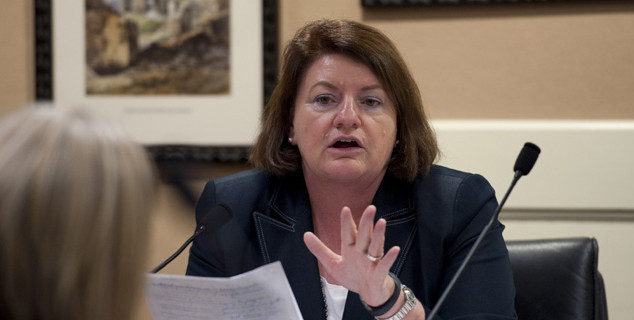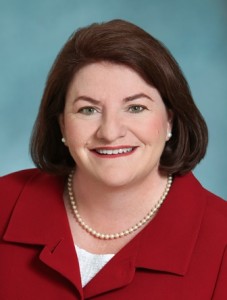News
Toni Atkins prepares for Assembly speakership
 Toni Atkins
Toni AtkinsFor Toni Atkins, a coal miner’s daughter and the first in her family to graduate from college, the road from Virginia coal country to San Diego to Speaker of the state Assembly has been long and winding.
Atkins, a San Diego Democrat who said she can “really appreciate the depths and the breadth of the people who live in California,” was chosen the next speaker in a closed-door caucus of Democrats, who control the 80-member Assembly with a supermajority. She currently serves as the Assembly’s majority leader.
She will succeed Speaker John Pérez, a former L.A.-area labor activist, who is termed out this year and is running for state controller. Atkins, like Pérez, is openly gay, although her sexual orientation has drawn relatively little notice in the Capitol.
Pérez served as Atkins’ mentor, she said.
“I feel really fortunate the speaker has given me the opportunity to be both the Majority Whip and the Majority Leader,” Atkins said.
She’ll be leading the lower house despite concerns – at least in the north state – that an old tradition over equitable leadership distribution between Northern and Southern California.
“For 40 years there has been an unspoken — and unbroken — rule that Southern California splits leadership of the Legislature with the Bay Area and greater Northern California. This year, Southern California leaders could seize complete control of the Legislature, winning leadership of both the Senate and the Assembly. We respect the importance of Southern California and often work closely with leaders there on key issues, but for the good of California, we must continue to share leadership,” wrote Bay Area Council CEO Jim Wunderman shortly before Atkins was chosen.
Her Republican colleague, Chino Hills Assemblyman Curt Hagman, who worked closely with Atkins this year on the Rules Committee, was pleased with the idea of a Speaker Atkins. He described her as open to hearing the minority party ideas, despite her own party’s supermajority.
“I really had to kind of keep a little bit more privacy because of the threats to people who ran clinics abortion services,” Atkins said.
“I think we all have input on some of the state’s issues, and I look forward to that,” he said. “Hopefully we have an open forum with her as Speaker… to express our ideas on how to solve some of the state’s problems.”
Former San Diego Mayor Jerry Sanders, who now heads the regional Chamber of Commerce, agrees.
“She probably won’t get an A from us,” Sanders told the U-T San Diego. “But for us, the important part is she is willing to talk. All we want is a chance to be heard and educate her on our issues.”
That hospitable nature could be a relic of her Virginian roots, which still emerge through her notable drawl.
Fresh out of college, Atkins moved across the country to San Diego with mere plans to help her twin sister raise a newborn. By chance she took a position as director of clinic services for a women’s healthcare center that would launch her career in Democratic politics.

Toni Atkins, next Assembly Speaker
But it was an especially volatile time for reproductive rights, and the job was a burnout experience. Atkins became a target for anti-abortion zealots. She said she would always look over her shoulder as she walked to car, and even removed herself from the phone book to avoid harassment.
“I really had to kind of keep a little bit more privacy because of the threats to people who ran clinics abortion services,” Atkins said.
She joined a few democratic clubs and went to work on a city council campaign for her mentor and former State Sen. Christine Kehoe, the first openly gay person to win an elected office in San Diego.
Atkins said Kehoe broke the barrier for the gay community in San Diego politics. “She encouraged me to run for city council,” she said. “It really wasn’t my plan. But I liked the work so much, once I got involved it just sort of happened.”
Local media that emphasized Kehoe’s sexual connotation mentioned the issue maybe once during Atkins’s eventual bid for city council, she said. “When I got elected it was sort of an afterthought. People like to think, historically, of San Diego as being kind of conservative. But it’s not true for civil rights or LGBT people. It’s just not true.“
Voters within the City of San Diego have a mixture of political views often unique to their residing neighborhood, which is true for most cities.
Mayor Dick Murphy resigned amid accusations of fiscal mismanagement and Atkins was eventually appointed to act as deputy mayor during the interim period. She was San Diego’s first openly gay mayor, serving until Sanders’ special election.
City Council District 3, which Kehoe and Atkins both represented, is the city’s most diverse community. It’s central to the city’s gay culture, and Kehoe said it is both ethnically and economically diverse—home to the very affluent, as well as most destitute.
“Toni worked with all of that,” Kehoe said. She said Atkins offered a stable hand to the city council during a very tumultuous time for San Diego.
In the mid-2000s, the city faced a looming pension crisis and political corruption charges. Mayor Dick Murphy resigned amid accusations of fiscal mismanagement and Atkins was eventually appointed to act as deputy mayor during the interim period. She was San Diego’s first openly gay mayor, serving until Sanders’ special election.
Atkins worked her way up the ranks of San Diego government, and now the same holds true with the her record in the state Legislature as she moves up to be speaker of the Assembly. The position, before term limits, was once the second-most powerful position in California government after the governor, occupied by such figures as Willie Brown Jr. and Jesse Unruh.
But the speaker still retains authority, with influence over committee assignments, fiscal issues, staffing and the direction of the Democratic Party.
Atkins said she remains a voice for the same issues she advocated for while working in community clinics.
While 22 states last year enacted some 70 abortion-related restrictions, Atkins gained national attention for successfully passing legislation to expand abortion access for women in California. “Most of what we do in life, I think, has a personal connection,” she said.
Atkins grew up in what she described as a working poor family. Her father was a coal miner and military veteran, her mother a seamstress. They couldn’t afford health insurance, their house didn’t have running water, and Atkins said her experiences sparked her desire for community engagement.
California is Democratic by voter registration statewide and there are politically conservative areas throughout the state, but San Diego is a bit of both.
“San Diego is one of the only toss up big cities in California, so that means anyone who is sort of on any one side of the ideological spectrum is seen as leading her party,” said Thad Kousser, a professor of political science at the University of California, San Diego.
Nathan Fletcher, a Republican-turned-independent-turned Democrat, is an example of a San Diego politician who unsuccessfully sought to bridge the ideological divide and failed to win a mayoral bid back home. Fletcher was well-known in Sacramento but that didn’t prove crucial in San Diego.
“If she’s seen as leading her party to the left in Sacramento, that doesn’t help her political future in San Diego,” Kousser said. “If she’s seen as leading the state on centrist path, then that could bolster her to a career afterwards across the city.”
Republicans hope her willingness to negotiate up to this point will translate over into her role as Speaker.
“I think it’s important that if you do have that power not to abuse it, but to bring in ideas and try to work collaboratively as much as possible,” Hagman said. “Even if you don’t need to, it’s better if you do.”
Want to see more stories like this? Sign up for The Roundup, the free daily newsletter about California politics from the editors of Capitol Weekly. Stay up to date on the news you need to know.
Sign up below, then look for a confirmation email in your inbox.

Leave a Reply